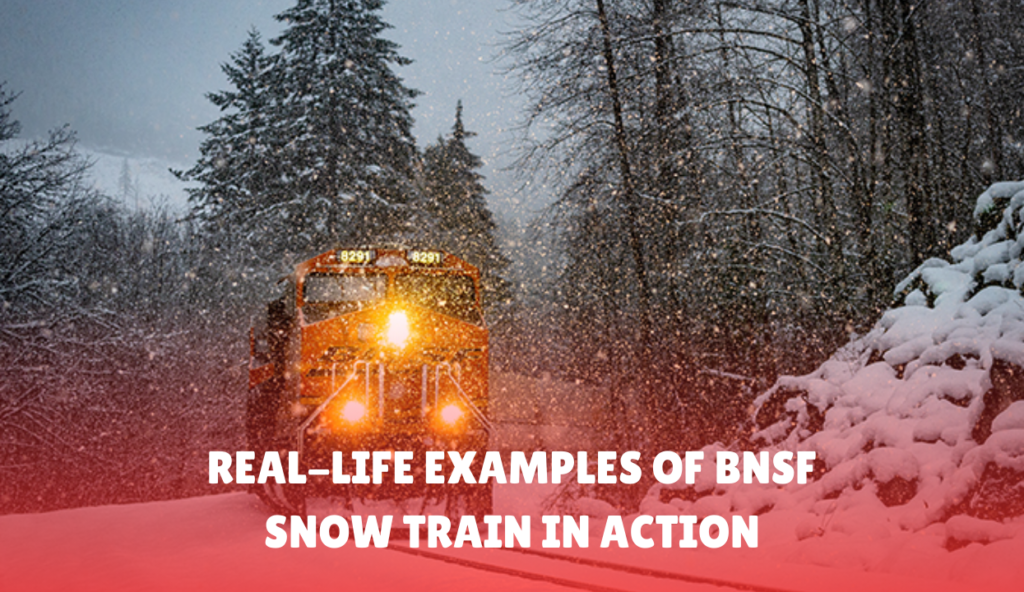BNSF Snow Train provides a structural framework behind continuous railway operations during the winter. This company ensures that necessary supplies and services come to destinations as planned, along with preserving the safety of passenger trains.
Supporting Logistics
The freight industry depends heavily on the snow train to keep the supply chain open. This ensures that supplies such as food, fuel, and even medical supplies arrive without delays, making it a vital part of regional and national economic stability in the winter.
Ensuring Passenger Safety
Passenger trains derive essential benefits from the snow train’s operations. Snow and ice removal on the tracks minimizes derailment and accident risk, meaning passengers are safer even during bad weather.
Environmental Impact
Over the last few years, the BNSF Snow Train has taken various steps to minimize its environmental footprint, thereby aligning its operational effectiveness with sustainability goals.
Energy Efficiency
These modern engines consume less fuel, which in turn reduces the production of greenhouse gases. This moves in tandem with efforts from all corners of the globe to fight climate change.
Sustainability Measures
BNSF is considering developing subsequent generations of the snow train on renewable energy and eco-friendly materials. Moreover, BNSF is coming up with ideas on how to recycle the old equipment so that there is minimal waste from the whole process.
Key Players in BNSF Snow Train Management
Behind the success of the snow train lies a dedicated team of professionals managing its operations seamlessly.
Team Coordination
A team of highly skilled operators, engineers, and support staff works round the clock for the efficient operation of the train. Coordination between them during snowstorms is critical for prompt deployment and operation.
Role of Engineers and Support Staff
The engineers are responsible for the maintenance of the equipment while support staff monitor real-time weather updates to map the routes and schedules effectively. Together, they form the backbone of the operations of the snow train.
Training Programs for Personnel
Operating a snow train requires specialized skills, and BNSF has advanced training programs for its personnel to equip them with the challenges of carrying out snow-clearing missions.
Simulation Exercises
Simulation exercises mimic extreme weather scenarios to prepare the team for real-world applications. This will boost fast decision-making skills and technical expertise.
Technical Skills Development
The staff goes through various workshops and certifications to keep abreast of the most modern equipment and technologies that ensure they effectively deal with modern snow train operations.
Real-Life Examples of BNSF Snow Train in Action
Over the years, the BNSF Snow Train has been part of several memorable operations that explain its importance and efficiency.

Memorable Operations
Some of these memorable operations include clearing tracks on record-breaking snowstorms in the Rocky Mountains. The train ran non-stop for 48 hours to ensure that normal freight and passenger services resumed without any delay.
Community Support
In addition to maintaining the railway, the snow train has helped communities during emergencies by clearing access routes for rescue operations. This therefore presents its broader application.
Safety Protocols Followed by the BNSF Snow Train
Safety is an utmost priority in the BNSF Snow Train, and it thus enforces strict procedures to protect both the operators and the machines.
Emergency Preparedness
Operators can also be prepared to act in case of an emergency, like equipment failure or sudden changes in weather. Communication systems are also onboard the train to keep in contact always with control centers.
On-Board Safety Systems
Advanced safety equipment, such as cameras and sensors monitor the performance of equipment and conditions and ensure accident-free and trouble-free operation.
Future Prospects for the BNSF Snow Train
The future of the BNSF Snow Train is bright, as it looks forward to further technological upgrades and capabilities.

Anticipated Upgrades
BNSF is investing in AI and machine learning technologies to further enhance weather prediction and operational efficiency. The better the enhancement, the more reliable the snow train is, even during harsh winter conditions.
Vision for the Future
Being a sustainability and innovation-focused railway, BNSF envisions the snow train as a global benchmark for clearing snow from railway lines with new safety and efficiency standards.
BNSF Train Powers Through Winter
The BNSF Snow Train marks a pinnacle of engineering and operational excellence. It is instrumental in keeping railway operations running without disruption during winters, thus helping support supply chains, communities, and the safety of passengers. It promises more efficiency, sustainability, and resilience as it continues to evolve into a more efficient operation.



